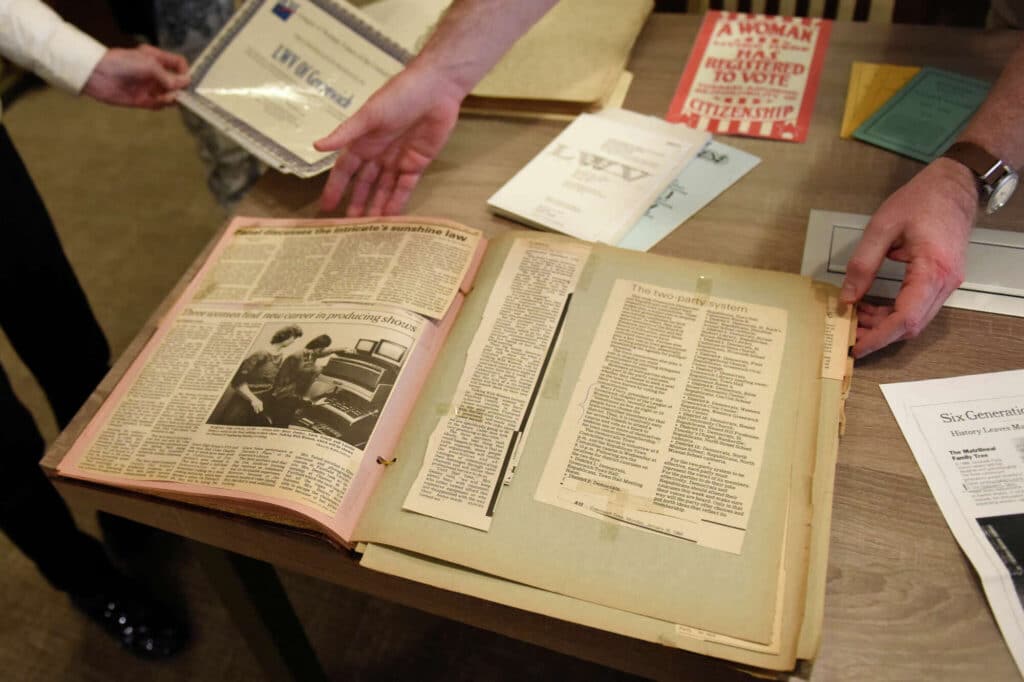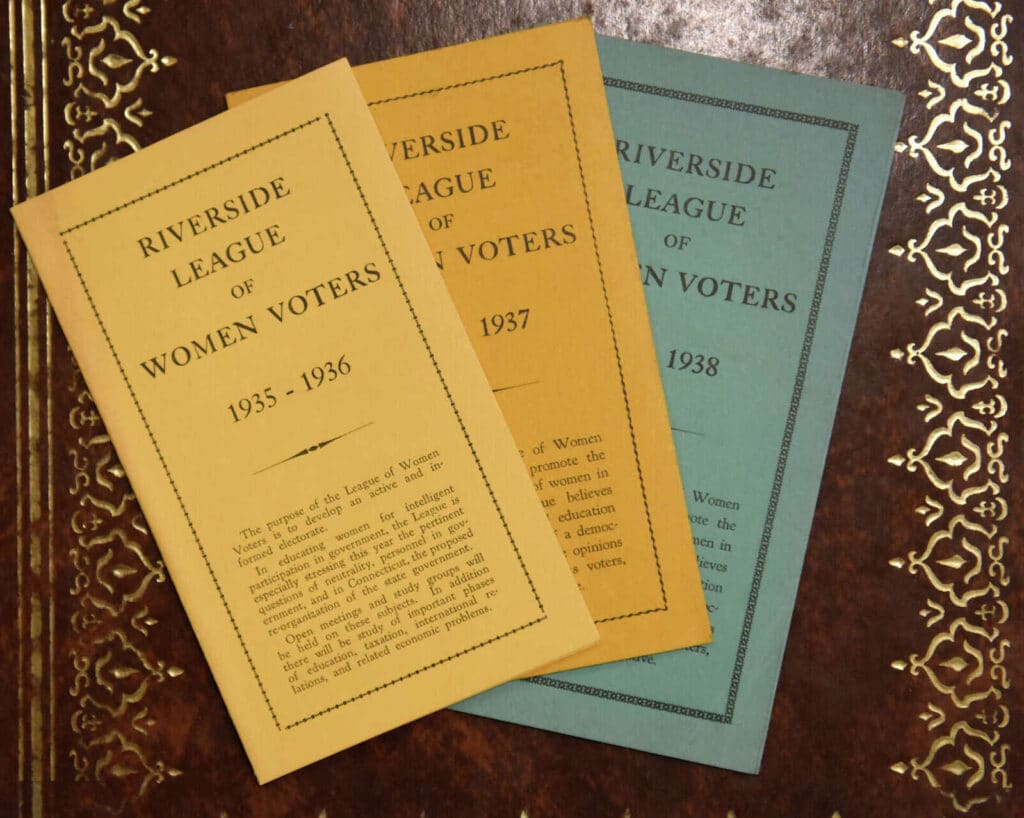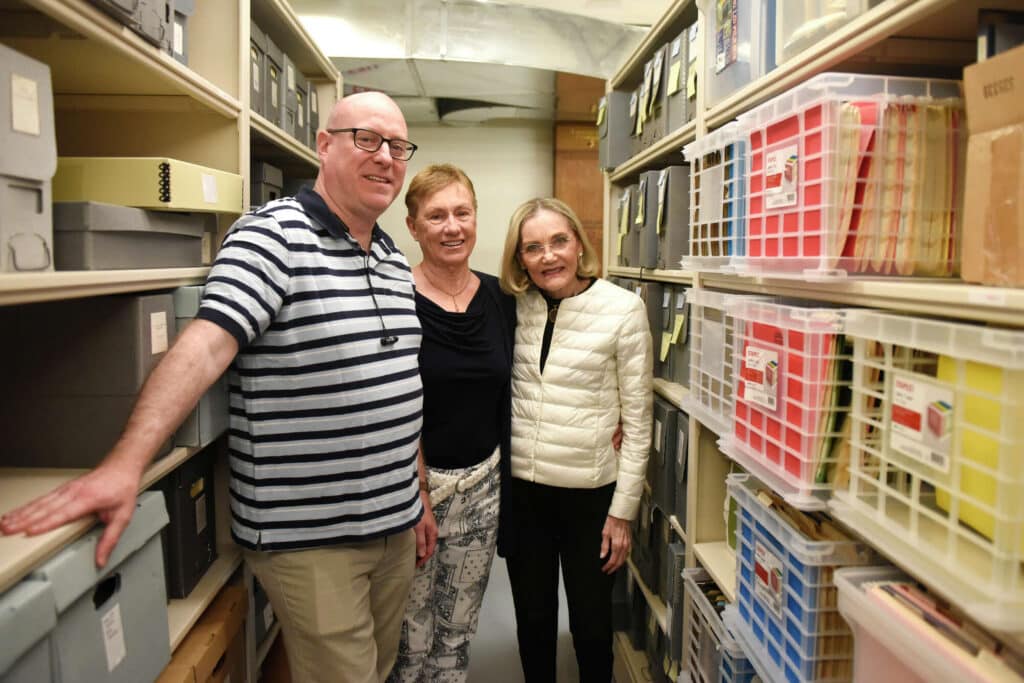Greenwich Time | Robert Marchant | April 16, 2023
GREENWICH — In 1921, a year after American women gained the universal right to vote, a group of Greenwich women got together and formed a local chapter of League of Women Voters to promote access to the ballot box and strengthen the spirit of democracy.
A recording secretary took careful notes of the very first meeting after the organization was formed.
Now those handwritten notes, and hundreds of other documents from the Greenwich LVW, are finding a new home at the Greenwich Historical Society. Some 25 linear feet of meeting minutes, studies, posters, educational brochures and other papers — which until recently had been housed in a barn in Riverside — will become part of the collection at the historical society and open to study.

The archivist at the Historical Society, Christopher Shields, said the partnership with the LWV made sense for everyone.
“The league — it has such a long history in Greenwich, and they’ve worked on so many important projects. And in addition to the importance of preserving the records, having them at the Historical Society will make them accessible, so people can learn from them. It becomes more of a resource, ” Shields said.
The collection had been carefully collected and stored by Jara Burnett, a former LWV president and an immigrant from the former Czechoslovakia who became an ardent champion of American-style democracy. She and the LWV leadership came to the realization that the archives were an important resource and needed to be preserved in a more suitable location than her barn, she said.
The Historical Society was putting together an exhibit in 2020 on the campaign for women’s right to vote that included materials from the LWV archives, which opened the process for the relocating the documents, both organizations said.
Lynn Garelick, the historian for the Greenwich LWV, was tasked with the job of emptying the barn and cataloging the contents, a Herculean undertaking.
“Little did I know,” Garelick joked.

The LWV historian had done a similar job archiving the records for Christ Church Greenwich from the1830s to the present, so she was prepared for the work. She was a history major in college, she noted, and “I know my way around old paper.”
Sandy Waters, the current president of the Greenwich LWV, said the numerous studies on Greenwich town government — such as suggested improvements to the Representative Town Meeting, best practices for an ethics policy, an examination of the functioning of the Board of Estimate and Taxation — were in the archives, a valuable source of information. A number of documents cover the contentious debate in 1946 over whether Greenwich should become the headquarters of the newly founded United Nations, a proposal that eventually failed, sending the U.N. to midtown Manhattan instead. Another community debate over how many high schools Greenwich should build in the late 1960s is in the archives.
Additional documents from the LWV will also be archived in the future. The Historical Society is looking to transcribe the older handwritten documents into a more modern format, index the collection more comprehensively and digitize much of the collection, Garelick said. The collection is currently open for research.
The non-profit voting organization encourages “informed and active participation in government” and “influences public policy through education and advocacy,” according to its information, and it is strictly non-partisan.
The Connecticut State Legislature approved the 19th Amendment allowing women the right to vote in 1920, after the measure had already achieved the necessary number of states to have ratified the new law. Greenwich was home to a number of prominent leaders in the Suffrage movement, as the right to vote was called, including Caroline Ruutz-Rees the headmistress of Rosemary Hall School when it was located in Greenwich, and Grace Gallatin Seton, a Greenwich author and travel writer who drove all over Connecticut to promote the cause.
The archives that date from that era will now be kept in safe storage and open for study, Waters said, adding she was thankful for the new home.
“This is valuable and worth preserving,” she said.

